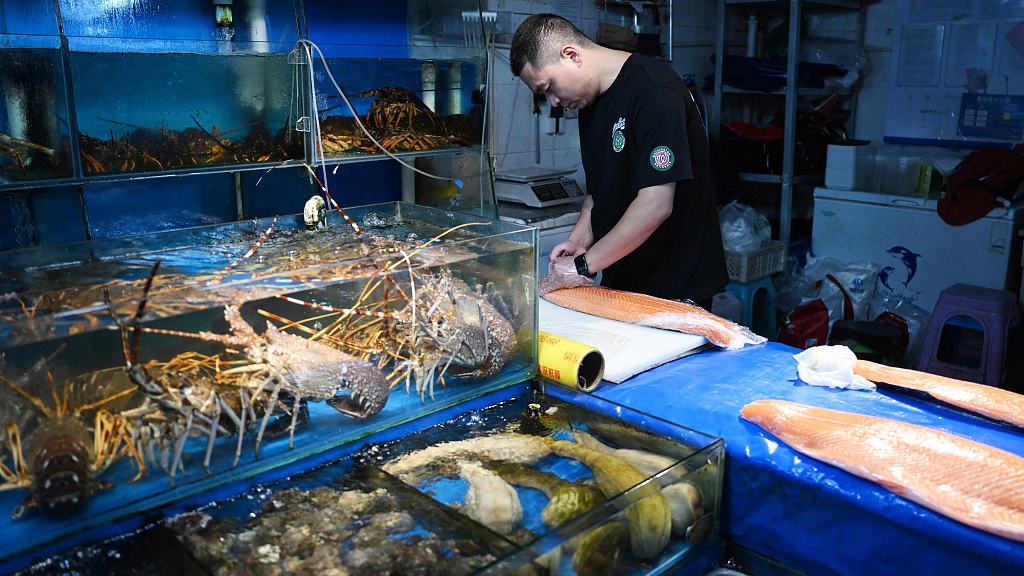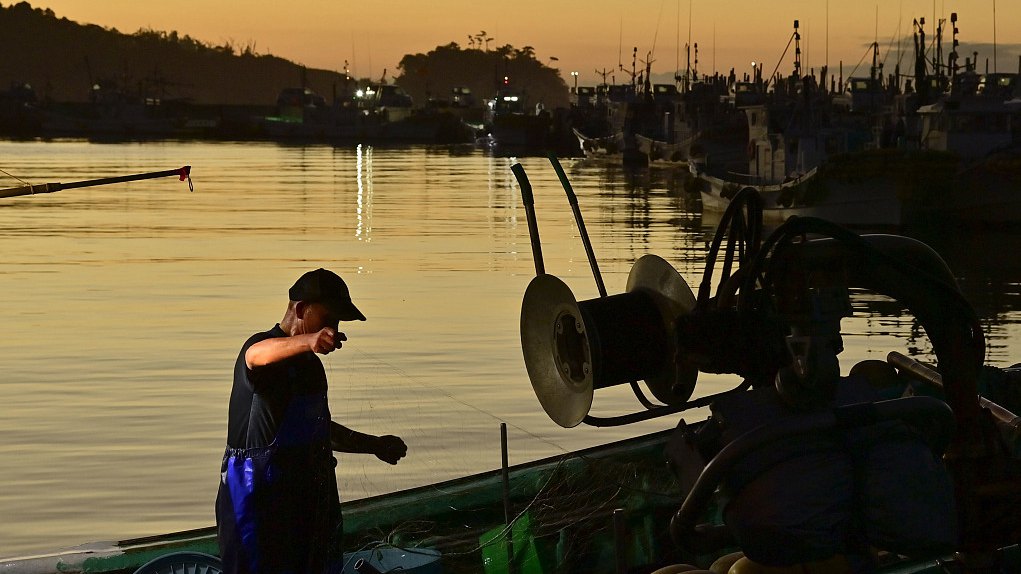
A vendor prepares salmon in a stall at a wholesale fish market in Beijing on August 24, 2023. /CFP
A vendor prepares salmon in a stall at a wholesale fish market in Beijing on August 24, 2023. /CFP
Despite consistent opposition at home and abroad, the Japanese government has put its nuclear-contaminated water discharge plan into action.
It started releasing radioactive wastewater into the sea on Thursday, with a first tranche totaling 7,800 cubic meters scheduled to be discharged over about 17 days. It aims to release 31,200 tonnes of the wastewater by the end of March 2024, and the whole release is estimated to take at least 30 years.
Following the contentious move, anxiety around food safety, especially seafood, has peaked and countries around the world have responded swiftly.
Thailand's Food and Drug Administration (FDA) on Saturday discussed inspections of seafood imported from Japan with the Department of Fisheries, the Office of Atoms for Peace and the Thailand Institute of Nuclear Technology, and said it will "double the amount of seafood samples collected for radioactive material search, to boost consumer confidence in their safety," reported the Bangkok Post on Sunday.
"The first batch of Japanese seafood after the wastewater release will arrive at Suvarnabhumi airport in mid-September and will be inspected by both the FDA and fisheries officials," it added.
South Korean Prime Minister Han Duk-soo said on Thursday that the country will strictly maintain import restrictions on Japan's fishery products, which were imposed to protect its people from radioactive materials after the Fukushima nuclear accident in March 2011.
On Wednesday, Malaysia's Health Director-General Muhammad Radzi Bin Abu Hassan said in a statement that the ministry will impose "a Level-4 (Surveillance) inspection at the country's entry points on high-risk food products imported from Japan for the analysis of radioactive material content."
China announced a blanket ban on aquatic products originating in Japan from Thursday to prevent risks from the contaminated water.
The U.S., while endorsing Japan's move and saying it is "satisfied" with the country's dumping wastewater process, was "making the biggest moves in decreasing imports of agricultural and aquatic products from Japan in the first half of 2023," according to media reports based on data from Japan's Ministry of Agriculture, Forestry and Fisheries.
"Data showed that the U.S. is the country that reduced the imports of Japanese agriculture, forestry and fisheries the most in the first half of the year, and the main production areas of the three kinds of food are all in the affected areas of the dumping of nuclear-contaminated water," Global Times reported.
No one stands aloof
According to a research by a German marine research institution, the radioactive materials will spread to most of the Pacific Ocean within 57 days of the discharge, to the U.S. and Canada in three years, and to the waters across the world in 10 years.
A team from China's Tsinghua University also simulated the long-term effects of the discharge by creating a diffusion model of radioactive materials on the ocean scale.
They found that the nuclear pollutants will reach the coastal waters of China 240 days after discharge, and will reach the coast of North America and cover almost the whole North Pacific Ocean in 1,200 days, according to the study.
"Subsequently, the pollutants will spread rapidly along the American coast to the South Pacific Ocean under the action of equatorial ocean currents, and into the Indian Ocean through the waters of northern Australia," it added.

A fisherman maintains fishing gear at a port in Soma in Fukushima Prefecture, Japan, August 24, 2023. /CFP
A fisherman maintains fishing gear at a port in Soma in Fukushima Prefecture, Japan, August 24, 2023. /CFP
The release will pose a threat to food safety, human health and cause ecological catastrophe, Lin Yongxin, director of Research Center for Maritime Silk Road at the National Institute for South China Sea Studies, told China Media Group (CMG).
Marine organisms absorb and accumulate radioactive substances from the environment through metabolism, and become carriers and disseminators of the radioactive substances. Contaminated substances can be brought to non-polluted areas through breeding migration or drifting and move up to human diets through food chain, said Lin, adding that unpredictability and uncontrollability of the release may cause great harm to human health.
The discharge risks causing an ecological disaster, said Lin. The radioactive elements contained in the wastewater have a long half-life period, which will have a much longer and more complicated impact on the marine ecology once they go into sediments or marine creatures.
The movement of the plankton will widen the affected range, Lin added.
Is seafood still safe?
As well as impacting seafood, radioactive isotopes are volatile substances which can also exist in the soil and air.
"In other words, food, skincare products, clothing and other products will also be affected in the long run," said Professor Wu Wei from the Department of Biochemistry and Molecular Biology at Capital Medical University School of Basic Medical Sciences in Beijing.
"But with effective regulation, people can still buy safe products," Wu told Chinanews.com on Friday.
Wei Fangxin, researcher from the Nuclear and Radiation Safety Center under China's Ministry of Ecology and Environment, suggested people stay vigilant but not worry excessively.
"Seafood purchased through formal channels is basically in line with national testing standards, and can be safely consumed," Wei was quoted by multiple media on Friday.
Experts suggest people to buy seafood from merchants with high market credibility and in a stable business condition, and the purchase receipt should be properly preserved, CMG reported.
Relevant Chinese authorities, including the Ministry of Agriculture and Rural Affairs, Ministry of Ecology and Environment and General Administration of Customs, have announced plans to strengthen monitoring and supervision to safeguard people's health.